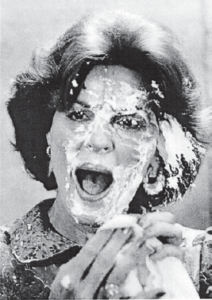OLYWA DAYS OF CHANGE
 I grew up in Yakima and came to Olympia in 1971. The WSU student newspaper had assigned me to do a story on TESC, a new college opening in the fall. Unhappy at WSU and intrigued by Evergreen, I became an original Greener.
I grew up in Yakima and came to Olympia in 1971. The WSU student newspaper had assigned me to do a story on TESC, a new college opening in the fall. Unhappy at WSU and intrigued by Evergreen, I became an original Greener.
I came out of the closet in 1972, letting my friends, family, and the world know that I was gay and proud. I’m over seventy now, and I partially credit my survival in a hostile culture to my refusal to suppress my sexual identity and to the ongoing fight for my rights. For fifty years I’ve been a gay activist. Our movement has had many victories, and the struggle is far from over.
It’s better in Canada, where I recently became a citizen, but even here many LGBTQ+ folks face threats. The forces of regression are relentless. In US states, homophobia is used as a tactic to rile up the right-wing voting base and to drive election fundraising.
Florida politicians, for example, whipped up a resurgence of hatred to trample on LGBTQ+ rights. They recently passed a “Don’t Say Gay’’ law that muzzles public school teachers and librarians. Still worse, Florida has made it illegal to provide gender-affirming health care for trans youth. It’s shameful. We queers have to keep coming out every single day to make our voices heard.
Remembering a struggle in Florida that reverberated in my small town
Anita Bryant was an also-ran Miss America contestant in 1959—Miss Oklahoma—and a Christian pop singer who became a spokesperson for the lucrative Florida citrus industry. She popularized their slogan: “A day without orange juice is like a day without sunshine.”
Anita was also a rabid homophobe and a lightning rod in the thunderhead of anti-LGBT politics of the late 1970s. Anita Bryant was a piece of work.
In 1977, Miami (Dade County) passed a local ordinance banning discrimination against gay and lesbian residents in employment, housing, and accommodations. Anita and her evangelical zealots successfully campaigned to overturn the ordinance. They conducted a well-financed media blitz to brand gay men and lesbians as child molesters. Their political action group was called Save Our Children (save them from the gays, that is). She went on the road with a national campaign.
 The LGBT response was vocal protest in several cities and a national boycott of Florida orange juice. Anita famously got “pie’d” at a press conference in Iowa. She ended up galvanizing the gay and lesbian communities. LGBT folks leapt into the politics of nondiscrimination legislation, just ahead of the AIDS pandemic.
The LGBT response was vocal protest in several cities and a national boycott of Florida orange juice. Anita famously got “pie’d” at a press conference in Iowa. She ended up galvanizing the gay and lesbian communities. LGBT folks leapt into the politics of nondiscrimination legislation, just ahead of the AIDS pandemic.
In a way Anita helped us prepare for what was coming—all the death, repression, suffering, and indignities of the Reagan era.
But I get ahead of myself
People in major cities on the West Coast swung into action—San Francisco, Seattle, Portland. Even in little Olympia, Washington, where I lived in 1978, we had anti-Anita singers. Karen Silkwood Memorial Choir, a neighborhood vocal group, met regularly to sing labor, feminist, and anti-war songs. We occasionally performed around town—young people bursting into song. Karen Silkwood, the namesake of our choir, was a labor activist murdered by the nuclear power industry when she tried to expose safety issues at the Kerr-McGee uranium facility— coincidentally in Oklahoma from whence Anita Bryant came.
Our choir had close ties to a theater company in Portland known as Family Circus. They wrote and staged plays in the style of the San Francisco Mime Troupe. Members of Family Circus wrote a satirical song about Anita Bryant that the Silkwood singers often performed. Here’s part of that song:
The Orange Juice Song
Down in the wet coastal town of Miami,
where Yankee dollars and southern charms meet.
The drinks may be dry, but the jailhouse is clammy,
so don’t take your loving out into the street.
There once was a Dade County statute that read,
regardless of who you make love with in bed,
you still need a job and a roof overhead.
But that was too loose
and gave some folks excuse
to turn out with crosses and turn up the juice.
Chorus:
Oh, oh, oh. Orange juice, orange juice,
Florida-da-da-da orange juice.
Lemons and oranges fresh from the trees.
But they aren’t the only fruits getting the squeeze.
Stopping Initiative 13
Protecting against discrimination Anita shopped her anti-LGBT campaign around to several states and cities. Seattle had passed anti-discrimination ordinances in the 1970s protecting women and gays. These ordinances were threatened with repeal in 1978 by Initiative 13. Anita promoted the initiative with her special brand of hate mongering.
 In the fall of 1978, Olympia’s Karen Silkwood Memorial Choir proudly performed the Orange Juice Song at a rally against Initiative 13 to a throng gathered at Westlake in downtown Seattle. It was one of many memorable events staged by the LGBT community that fall. The effort to stop Initiative 13 was the best-organized and most successful gay rights campaign in Washington State up to that point. The initiative was defeated two-to-one by Seattle voters in November—a major victory for LGBT rights.
In the fall of 1978, Olympia’s Karen Silkwood Memorial Choir proudly performed the Orange Juice Song at a rally against Initiative 13 to a throng gathered at Westlake in downtown Seattle. It was one of many memorable events staged by the LGBT community that fall. The effort to stop Initiative 13 was the best-organized and most successful gay rights campaign in Washington State up to that point. The initiative was defeated two-to-one by Seattle voters in November—a major victory for LGBT rights.
I was a thespian who adored musicals
This was all happening at the same time the musical Evita was making Patti LuPone a legendary Broadway diva with her portrayal of Eva Peron. I couldn’t help but draw a parallel: Anita / Evita. Smalltown girls rock the media, go into authoritarian politics and become the object of religious adoration.
I was also a graphic designer at the time, and I found the show’s logo—an art deco Evita in a sunburst—ripe for parody. I created a copycat version of the sunburst featuring an image of Anita Bryant in the same style. With a two-letter change, Evita became Anita. Lovers of musicals appreciated my humor.
Nondiscrimination ordinances
Over the next few years many cities in Washington passed non-discrimination ordinances. Olympia was one of the first after Seattle. Eventually, protections were extended to the whole state and Washington is now considered one of the gay-friendliest in the country.
Perhaps it is a fitting postscript to note that Anita Bryant’s granddaughter came out as a lesbian last year (2021) and announced her marriage to another woman.
Don is a lifelong activist, a founder of the Cooper Point Journal, the Gay Resource Center, Emma Goldman Collective, Theatre of the Unemployed, and Hard Rain Printing Collective. Also an actor, dancer, set designer or director; a graphic designer, and a public health educator for 25 years. In 2014 he moved to Canada with his husband. He’s currently on the coordinating committee for a Vancouver writer’s group, Quirk-e (Queer Imaging and Riting Kollective for Elders).

The Olywa Days of Change website offers a collection of memories about life in Olympia, Washington during an era of significant social change from the 1960s through the 1980s. Before our memories leave us, we want to share some of our stories and the community that we built together here in the Pacific Northwest. The era included the horrors of the wars in Vietnam and Central America; the reverberations of the civil rights movement; the second wave of feminism and women’s rights; the Stonewall Inn riot and the rise of the LGBTQ movement; rock festivals and Love-ins; Earth Day and the growing environmental movement; revolutionary politics and art; and a national debate about making education relevant to the demands of a changing world, which gave birth to The Evergreen State College. These stories are written by and for the people who lived in Olympia during that time. We hope they offer insights for the future given that our stories revolve around the perennial needs of humans everywhere—food, housing, work, the arts, music—and how we experimented with ways to meet those needs with fairness, equity, and creativity. Just as our experiences were shaped by the people who came before us, so might our stories feed into the lives to follow. This website offers many memoirs, historical accounts, and iconic images. We are still in the gathering phase, seeking contributions as well as interviews. Please help us add to this collection. Contact us at OlyWa Days of Change. |

Be First to Comment